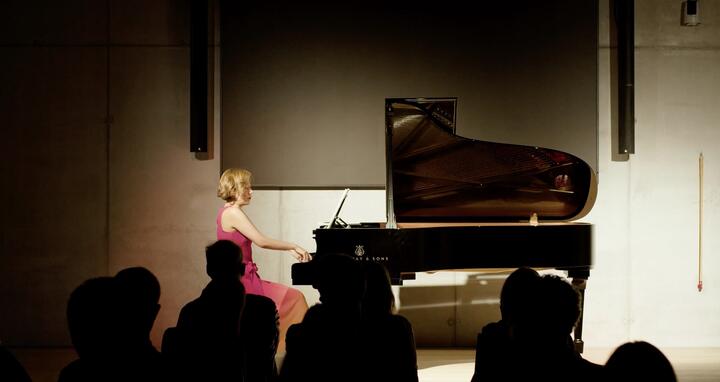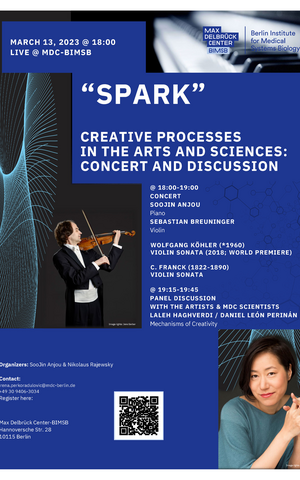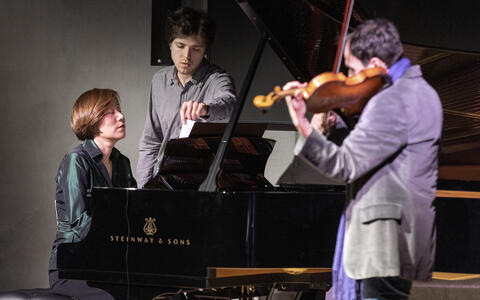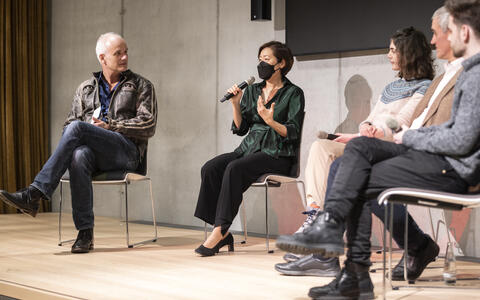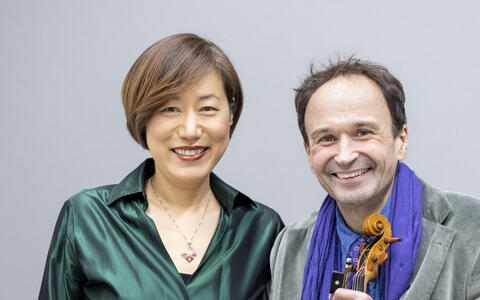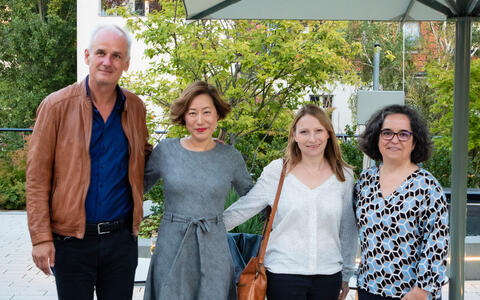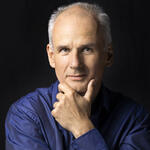An element of surprise and serendipity
Are you happy that you can meet in person?
SooJin Anjou: Yes! My husband and I were both very careful for a long time, much longer than most other people. Once I actually started meeting people again – and I don’t mean just professionally, even neighbors and friends –, I immediately noticed how much more gets put into action.
Nikolaus Rajewsky: My professional life was, as for many other people, in distress. Because the science here is between different disciplines, and for that you need to communicate a lot. Doing it by zoom is a suboptimal solution. And the real fun that comes from intense communication. Really creative discussions can rarely be replicated or found by zooming.
Is it a bit like in the Sistine Chapel, where the spark is only transmitted when Adam and God actually touch? What will the event be like?
Anjou: We are going on an exploration together, a shared journey of learning and discovery. At the last session, we talked about the semi-lucid state between sleep and wakefulness and how that can be used for creative work. We also aim to have a musical premiere at each concert, whether it is a world premiere or a Berlin premiere. The Köhler sonata on March 13th was a world premiere.
Rajewsky: Most people think that science is: people sit there and work out problems. That is part of science. But the much more challenging part is to imagine the really new questions and problems to begin with. And there you cannot work with deducing things. This does not start from something and then by combinatorial working-out of logical connections you come up with the solution. The new stuff is always somehow intuitive.
Anjou: There is an interesting irony, a duality to music and science. This misunderstanding of the nature of what we do goes both ways. A lot of people from the outside might think that music is all about inspiration and finding the muse. But in fact, so much of it is problem solving.
Could you give an example?
Anjou: There is always form in composition, even if it’s free form. You have germinal creative ideas that start the piece, but you also have to keep an eye on the structure, whether it is a simple A-B-A form or a free-floating structure from beginning to end without recurring sections. You need proportions: is this too long, is this too short, have I exploited this theme enough or overused it? And the performers have their own problems to work out, for example: how do I maximize the expressive potential of the piece that I am playing, or on a very basic level, how do I work out this technical problem? How do I practice it so that it sounds effortless and suits the musical style? What are the less obvious aspects of the music that I need to unearth? Akin to what Nikolaus said earlier, coming up with interesting questions in the first place is essential in music as well.
Are there mechanisms of creativity?
Rajewsky: It’s even a field of research. In neuroscience, it has always been a question why some people solve a problem intuitively and others solve it by trying out every possible combination until they find the right one? You can actually give problems to different people and monitor their brain activities. There is a whole volume of detailed work on how nerve cells are wired to allow optimization of one or the other approach to a solution. And of course, if you see it from an evolutionary point of view, if you stand in the jungle and from one direction a lion is coming forward and from the other a big monkey and you see a snake lifting its head right in front of you, you probably don’t have time to go through all the different scenarios that could happen. You need to make a decision and find a solution on the spot. So, what you need is speed and intuition, which is some kind of internal overview of everything you have ever experienced. There is a lot of thought and work about this topic that is unfortunately not part of the curricula in high-school or university.
Anjou: When you improvise music, there is an almost infinite number of paths to take at any given moment, as in in the monkey-and-snake-situation, and you have to choose instantly which way to go. It’s partly experience and partly instinct, but instinct can be built upon a bedrock of past experiences. Making these constant split-second decisions but still keeping an eye on the overall structure, so that it doesn’t just sound like one thing after another. The totality of the performance is more than just the sum of individual parts –– this is a constant quest for the performer and artist.
Mr. Rajewsky, you studied piano. In which way does your piano playing help you to find a solution in your work as a scientist?
Rajewsky: I have no idea. But what I can say is that doing one or the other is opening up and freeing me somehow for the other side. It works both ways.
We have talked now about the relation between experience and intuition – which brings me to the field of machine learning. You, Mr. Rajewsky, biochemically record and then analyze extremely large amounts of data with computers. And you, Ms. Anjou, combined artificially created sounds and acoustic music in your world-premiere recording of Morton Subotnick’s electroacoustic piano pieces. Would “Talking to machines” be a good alternative title for your concert and discussion program “Spark”?
Rajewsky: We have already discussed that one of the Spark events will be specifically about machine-learning possibilities and its relationship to us.
Anjou: The advancement of Artificial Intelligence (AI) just in the last couple of years – and even just in the last month with ChatGPT and the new Bing – it actually affirms my faith in music. Many musicians grapple with the question: OK, I am a musician, I love what I do, and I am very privileged, but is this really urgent work for humanity? There are doctors and researchers and human rights lawyers who are doing work that impacts people immediately, saving lives right now. Is what I do really as valuable? But actually, I have less doubt now in the age of super-advanced AI, because it seems to me that human beings as musicians will not be replaced. The humanness of music making is what makes it valuable. This unpredictability, this imperfection is what makes human performance interesting and compelling.
(f.l.t.r.): Nikolaus Rajewsky, SooJin Anjou (Pianist), Charlotte Bray (Composer) and Ana Pombo at the first Spark event in 2022.
Rajewsky: Maybe in fifty years AI can also create things that we just adore, and maybe that will become the next level of evolution. The distance is sort of shortening, because you can ask machine-learning programs to take several speeches I have given and to combine them into a new speech about something I have never talked about. In good approximation of the way I would speak about it. I would therefore not be surprised to listen to Vladimir Horowitz, in a piece he never played and which the machine-learning program has put together out of all the existing Horowitz recordings. Ok, it would never be as interesting as Horowitz would have played it, but still… It is a very interesting discussion and an important one also for scientists, how much machine learning is replacing us. The young scientists are of course also wondering what is going on, at which point will their work at least in part be replaced by the work of a machine? The fear factor is there, but there is also always a fun part. It is an astonishing development.
Does this put us into a competition with the machines, because we can never be as perfect as they are? Are they humiliating us?
Anjou: There was a composer called Johann Nepomuk Hummel, a contemporary of Beethoven’s, who was very successful in his days, very celebrated. And I played some of his works in a recital along with Beethoven’s pieces. It’s very, very good music, but in the end, I got so bored playing it, because it is well-crafted but so predictable (apologies to Hummel!). And this is what I imagine very good AI being able to do in the near future. The difference is this element of surprise, not just random surprise for the sake of surprise, but surprise that just reveals a whole other dimension in the music and elevates it to a whole other, perhaps transcendent, level.
What would you like to realize with your series “Spark”?
Anjou: Actually, we want there to be serendipity and spontaneity, and for sparks to fly without our micro-managing the outcome. It will happen if we just provide the opportunity. I once asked an astronomer friend of mine: “What do you do to be creative?” And she said: “Well, you go to conferences and get drunk with your colleagues.”
On the other hand, we would also love to see applicable insights stemming from our events, like this one piano and mathematics student who was present at the discussion on the semi-lucid state. She told me a few weeks later: “You know, it worked! I was puzzling out this mathematical proof before bed, which I then planted in my head before falling sleep; and in the morning I had the answer!” It would be cool to see more of that! But more generally, even we cannot predict the full range of benefits that could come out of this collaboration, and we certainly look forward to being surprised.
Interview: Elske Brault
Further information
- Nikolaus Rajewsky reseacher profile: The visionary
- Next Spark event on June 27
- Music meets science

